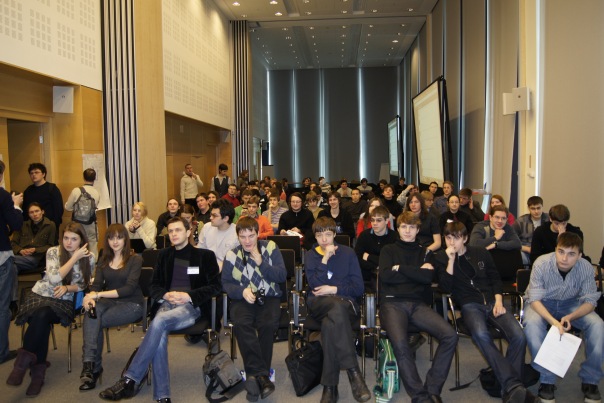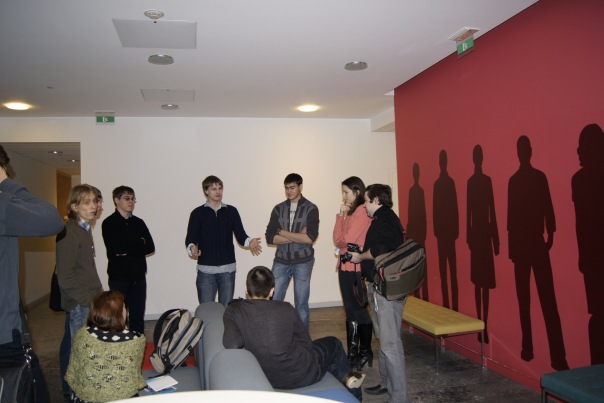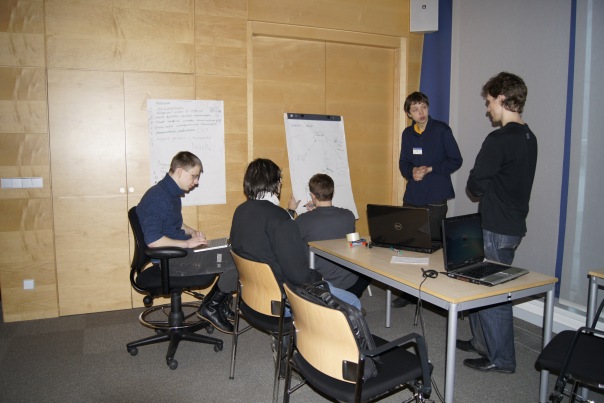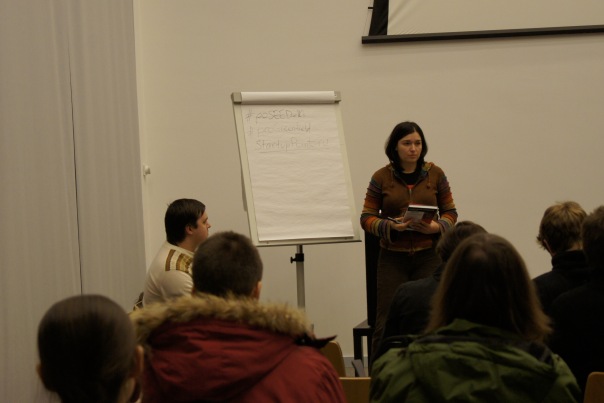Imagine Cup Programming and Entrepreneurial Fees
Greetings to all Habr readers! This is my first post, so a few words about myself.
I am studying at MGUPI, which is not unimportant in the specialty “Software for computer technology and automated systems”, so welcome colleagues!
I am also a Microsoft Student Partner.
I would like to talk about my impressions of the interesting event that Microsoft has prepared for students.
Saturday, January 29th, the most active and advanced students spent a busy and exciting day at the Microsoft office. They attracted everyone, the so-called Imagine Cup programmer-entrepreneurial fees.

Imagine Cup is an annual student international competition held in a number of categories. The competition, on the one hand, provides students with the opportunity to realize their ideas in various fields, and on the other hand, facilitates communication and the exchange of experience between students from all over the world.
As a rule, it is not always so easy to find “your” team or “your” idea, and the potential calls into battle. One way or another, you should not retreat!
The participants of the event, in the first part of the day, were asked to break up into random teams (by numbers issued at registration), and in 20 minutes to come up with a solution to improve the performance of a particular global problem using modern technologies. So teams, consisting of strangers, for a short period of time presented very unexpected, interesting, sometimes extraordinary options.

The second part of the day was devoted to the independent formation of the team. Many were able to voice their ideas, to search for like-minded people, some thought about the idea as a formed team, there were those who were fully armed, with a team and an idea. For all the action was given 3 hours, during which it was necessary to wrap the idea in the appropriate shell. Namely: to formulate correctly the very meaning of the idea, to identify its usefulness, to consider the most correct means for solving the problem, and, subsequently, to present your project through a presentation and, possibly, a prototype of the project.
Interestingly, in my case, the team appeared faster than the idea. But this did not stop us, and a completely different spectrum of potential ideas came to mind. Thinking about the everyday and the vital, an idea suddenly appeared about an interactive map of minibuses. Why not keep track of exactly where the transport is located, when it arrives, and most importantly, how many seats are available. First of all, we thought about how to justify the psychological factor of human expectation. When a person knows, owns information, and it turns out to be true, then this is a more advantageous situation than when schedules do not justify their purpose. And we called it all faseBus.


5 projects focused on solving completely different problems were put up for refereeing. Travel topics were affected; ideas on how to make the city safer; options for mutual use in everyday life of cars; methods to combat the long-term expectations of ground transportation; and even a project to develop children through origami.
Origami has become that very extraordinary idea, thought out by students of the Moscow Aviation Institute, which stood out from the others. This is unexpected, interesting, and cannot go unnoticed! It was they who became the well-deserved winners of the day.

Speaking of judges. Among a small circle of judges were Ustyuzhanin, the team leader at ImagineCup 2005, as well as a judge of international finals. A person with such experience of refereeing gave really the most relevant and useful advice. For which he thanks a lot from all participants of the event.

Throughout the day, it was possible to consult with experts, speak out on twitter feed, which was broadcast on screens, and just spend time with benefit. In addition, the audience was able to find out about what other events you can try to show their strength. This topic was revealed by Maria Adamyan from the business incubator of the Higher School of Economics, talking about entrepreneurial activities in the life of students.

Everyone could feel for themselves that they came up with drafts of ideas, unite with strangers in one goal and achieve progress, really, even within one day. Perhaps this event will help students decide to break into the world of IT-technologies, not be afraid to develop their ideas and not lose their time.
I am studying at MGUPI, which is not unimportant in the specialty “Software for computer technology and automated systems”, so welcome colleagues!
I am also a Microsoft Student Partner.
I would like to talk about my impressions of the interesting event that Microsoft has prepared for students.
Saturday, January 29th, the most active and advanced students spent a busy and exciting day at the Microsoft office. They attracted everyone, the so-called Imagine Cup programmer-entrepreneurial fees.

Imagine Cup is an annual student international competition held in a number of categories. The competition, on the one hand, provides students with the opportunity to realize their ideas in various fields, and on the other hand, facilitates communication and the exchange of experience between students from all over the world.
As a rule, it is not always so easy to find “your” team or “your” idea, and the potential calls into battle. One way or another, you should not retreat!
The participants of the event, in the first part of the day, were asked to break up into random teams (by numbers issued at registration), and in 20 minutes to come up with a solution to improve the performance of a particular global problem using modern technologies. So teams, consisting of strangers, for a short period of time presented very unexpected, interesting, sometimes extraordinary options.

The second part of the day was devoted to the independent formation of the team. Many were able to voice their ideas, to search for like-minded people, some thought about the idea as a formed team, there were those who were fully armed, with a team and an idea. For all the action was given 3 hours, during which it was necessary to wrap the idea in the appropriate shell. Namely: to formulate correctly the very meaning of the idea, to identify its usefulness, to consider the most correct means for solving the problem, and, subsequently, to present your project through a presentation and, possibly, a prototype of the project.
Interestingly, in my case, the team appeared faster than the idea. But this did not stop us, and a completely different spectrum of potential ideas came to mind. Thinking about the everyday and the vital, an idea suddenly appeared about an interactive map of minibuses. Why not keep track of exactly where the transport is located, when it arrives, and most importantly, how many seats are available. First of all, we thought about how to justify the psychological factor of human expectation. When a person knows, owns information, and it turns out to be true, then this is a more advantageous situation than when schedules do not justify their purpose. And we called it all faseBus.


5 projects focused on solving completely different problems were put up for refereeing. Travel topics were affected; ideas on how to make the city safer; options for mutual use in everyday life of cars; methods to combat the long-term expectations of ground transportation; and even a project to develop children through origami.
Origami has become that very extraordinary idea, thought out by students of the Moscow Aviation Institute, which stood out from the others. This is unexpected, interesting, and cannot go unnoticed! It was they who became the well-deserved winners of the day.

Speaking of judges. Among a small circle of judges were Ustyuzhanin, the team leader at ImagineCup 2005, as well as a judge of international finals. A person with such experience of refereeing gave really the most relevant and useful advice. For which he thanks a lot from all participants of the event.

Throughout the day, it was possible to consult with experts, speak out on twitter feed, which was broadcast on screens, and just spend time with benefit. In addition, the audience was able to find out about what other events you can try to show their strength. This topic was revealed by Maria Adamyan from the business incubator of the Higher School of Economics, talking about entrepreneurial activities in the life of students.

Everyone could feel for themselves that they came up with drafts of ideas, unite with strangers in one goal and achieve progress, really, even within one day. Perhaps this event will help students decide to break into the world of IT-technologies, not be afraid to develop their ideas and not lose their time.
